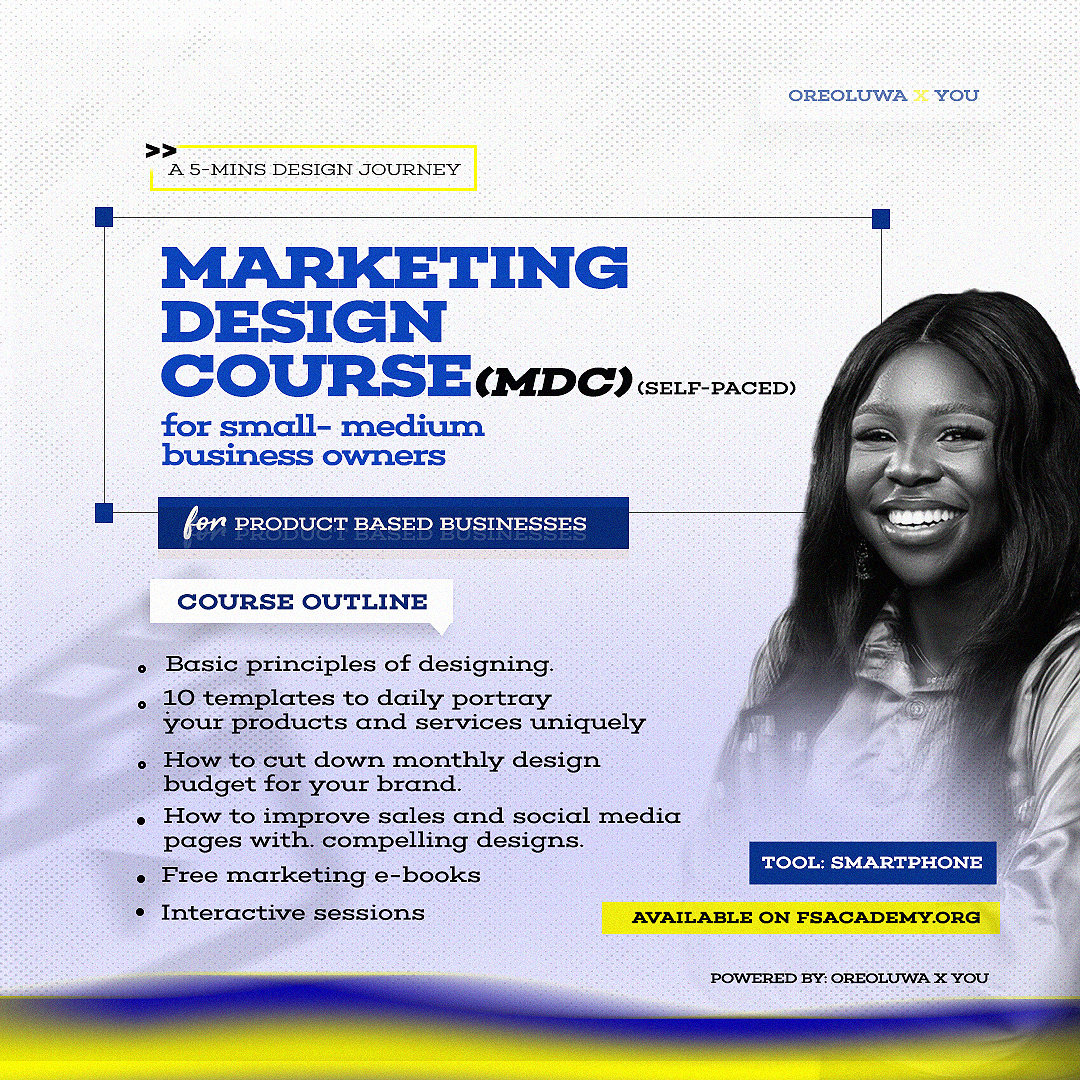When you were younger, did anyone ever ask you what you’d like to be when you grew up? That’s a question every child was asked while growing up. But the sad thing is, you didn’t know how to find your career path back then. And so your answer must have been: a banker, lawyer, doctor, pilot, or whatever profession you had told those prying adults.
Kickstart your career with urgent 2k by selecting the courses in this archive. Each course you find here is available for just #2,000. This promo offer ends soon, so take advantage of them now.
As you grew up, your choices began to change for one reason or the other. And now, you’re an adult. You’ve realized the occupation you said you wanted to pursue as a child was all a hoax.
You have to find your career path, chase it, and make enough money to take care of your loved ones.
But it isn’t just about finding a career. If it isn’t the right one for you, your efforts will be in vain. And if that’s the reason you came to this page, rest assured you’ll find directions in this article.
Let’s dive right in.
What is a Career path?
First of all, the term “career path” has several meanings according to the Cambridge dictionary. But one by Alison Doyle, a Job Search Expert, captures its meaning.
“A career path is a series of jobs that help you progress towards your short and long-term career goals and objectives. “
Many people are trapped in jobs they hate and are trying their hardest to switch. Some follow a straight career path within one field, while others change fields periodically to achieve career goals. Honestly, there’s no one way to climb the career ladder, what matters is taking up career opportunities to grow.
And if you’re currently stuck at your job, looking for ways to better your career? Future Syllabus has all you need to develop your chosen career path, with the right skills at the right time.
However, when thinking of a good career path, have the following thoughts in mind:
- There are endless possibilities
- Your failures don’t define you
- You don’t have to sort it all at once
- Be patient
- It’s okay if finding your path takes time
- Explore & take up possible opportunities to discover your interests
- Every opportunity always leads to another. So take every one of them seriously
- It’s okay to switch career paths
Now, let’s see…
Why Is Finding Your Career Path So Hard?
How many young adults do you think are walking the path they chose as a child?
According to Mashable, almost 80% of adults don’t end up following the career path of their six-year-old imaginations. That means only a minute 20% follow their childhood dreams.
The reason for this isn’t far-fetched: life happens.
Life tosses us into different boats, leaving us to take a particular stand or risk drowning. And this is the reason, many are stuck with jobs they detest but find it difficult to transition.
I must commend you for being on this page. It means you’re ready to find and follow the best career path for you. But before we go straight ahead to learn how to find a good vocation, let’s see why finding one has been difficult in the first place.
- Switching Paths without Mastering Anyone
Some think if they switch their career to something else, others will perceive them as being confused. And that’s because they’re always quick to jump into different vocations without exploring one well enough.
If that is you, change. There’s nothing wrong with switching occupations. The problem is when you don’t master any.
- Choosing a career path for the wrong reasons and priorities
If you rush into that profession only for money, chances are you’ll get burned out soon, especially when you realize money isn’t the only motivation you need.
Don’t get me wrong.
I don’t mean you shouldn’t consider money when choosing a career.
I mean you should think of other reasons like the opportunity to learn from and your love for the industry. If you do this, you’ll have more reasons to keep pushing when it gets tough.
- Lack of research and experience
You should have at least basic knowledge of any industry before rushing into it. Research about it and if it still seems unclear, go for internships or try volunteering.
This way, you get an inside experience of what the industry feels like.
- Having the wrong mindset
In some cases, you may be scared or close-minded. You may not be willing to take risks or you’re simply waiting for things to fall into place.
Many negative thoughts that creep into our minds can hinder us from choosing the right career path.
- You are uncertain
You can narrow down your list to a few options but still remain confused. This is normal and to solve the problem, you have to reduce the list by being honest with yourself about what you really want out of your career and what works for you.
Furthermore, asking for help from friends, mentors, and colleagues goes a long way too.
Other reasons are captured in this review article compiled by professors in the frontier of education that states. The article reveals that over 50% of career switches and bad career path choices happen due to overlooked factors like a poor work environment, unsatisfied working terms, etc.
I’ve been there, so I understand you and I want to help. So, keep reading to clear the path to choose the right career path that will lead to your goals.
How to Choose A Career Path
To find a good career path for you, you’ll need to ask yourself some hard questions and consider the following:
- What you love or would love to do
- This is essential as it forms the starting point of finding your interests and passion. Therefore, to figure out what you’re good at, ask yourself the following:
- What am I good at?
- What are my interests, motivations, and values?
- What did I most enjoy while growing up and at university?
- What kind of lifestyle do I want?
- What do I want from my career?
- What good career path am I meant to be doing?
- What is important to me?
Answer the above questions while being true to yourself. By doing that, you’ll find your area of interest.
- Don’t limit yourself
You might be thinking “I’ve always wanted to be a Doctor but now I’ve changed my mind, I don’t think I can switch too far, so I’ll just settle as a nurse.”
No, don’t think that way. Never settle or limit your potential when you haven’t tried out different areas of interest to make a decision yet.
- Focus more on experience and be humble to start small
Setting out to experience different job opportunities will give you a greater understanding of what each career path entails. Being open to learning the basics is always essential to every career path.
So be wise enough to accept any chance to learn. Remember that most successful people today once started just like you too.
- Access your current skill sets strengths and know your personality
You have to be well aware of what you can and cannot do. Don’t tell me you think you have none. You probably have more than you think you do.
So, don’t be scared to ask for feedback from friends, do tests, and observe yourself well. This will help you better match your skills to potential good career paths for you.
Furthermore, knowing your personality i.e. who you are, plays a big role in narrowing down your potential career paths. It’ll push you towards knowing your different interests, weaknesses, and strengths. A quick way to know your personality is to try out personality tests as many are available online today.
- Research and write out some career ideas
After the last steps, do your research on the market, responsibilities, entry requirements, descriptions, etc. Afterward, outline your selected career path ideas.
- More research
At this point, you know you are heading somewhere right since you have a shortlist already. So, you’ll need to dig more with in-depth research.
Arrange to meet with people who work in the occupations you are interested in. They will provide firsthand information about the careers on your shortlist.
- Decide and plan your career path goals
Finally, after all your research, you have to make your decision. So go ahead and pick the occupation you think will bring you the most satisfaction. And know you’re allowed to do it over again if you change your mind at any point in time.
Also, consider establishing goals for your career path. Research where other people in this field are five to ten years into their career, and take note of the job titles.
In addition, decide what advancements you would want in the future with a time track. Then research what you can do to reach those goals. That is your career action plan.
You’ll also need to undergo training or courses and take on specific responsibilities to achieve this as you wish.
And when you’re done, answer these questions to be certain about your decision:
- Do you feel at peace with your decision?
- Do you think you’ll feel a sense of purpose/satisfaction/fulfilment on this job?
- Are you ready to take action to make this career go well for you?
If your answers are positive, you’re on the right track. And if you’d like to keep tabs with the right information while treading your career path to success, subscribe to our newsletter below.
Future Syllabus will make the journey easier for you by sending right to your mailbox, free courses, and training that’ll step up your career growth.















